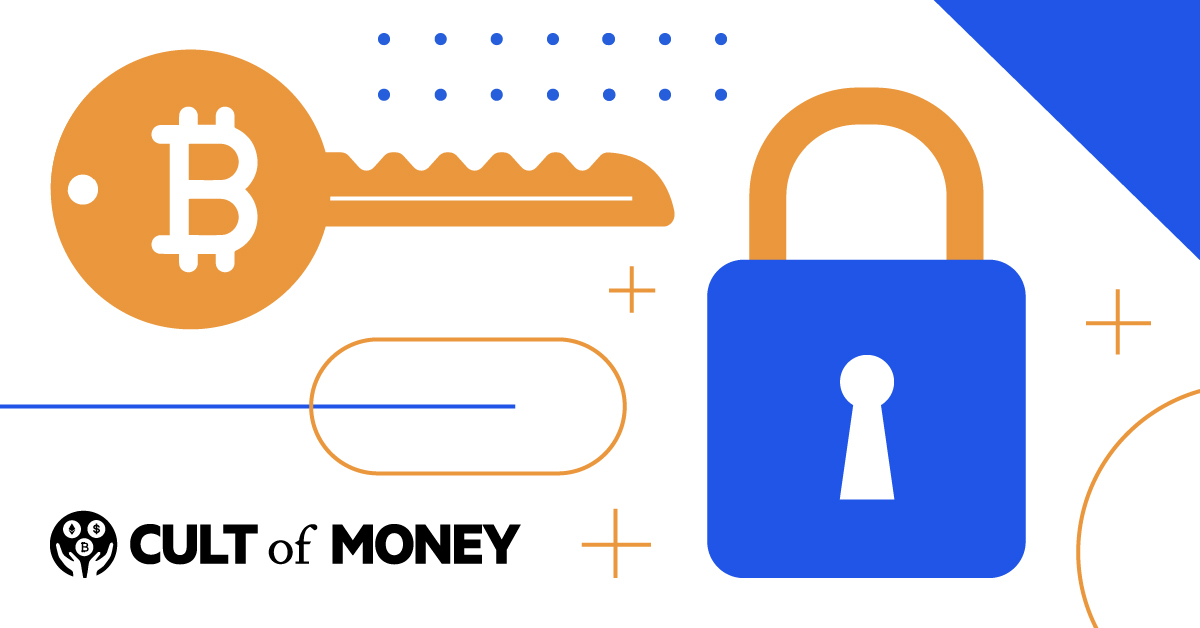
There’s a common saying in cryptocurrency: “Not your keys, not your coins.” Stated another way, you could say, “not your keys, not your crypto.”
But what exactly does that mean this saying mean? And, why is it important for cryptocurrency investors to understand?
Here’s a closer look at the meaning of this cryptocurrency saying and how it can influence where you keep your digital currency.
Not Your Keys, Not Your Crypto - Definition Explained
If you’re surfing cryptocurrency communities on Reddit, Discord, Twitter, and other social sites, you will likely come across a common saying: Not your keys, not your coins.
The term "not your keys, not your coins" means that you’re not in complete control over your cryptocurrency unless it’s stored in a digital wallet where you control your own private keys.
This is because cryptocurrency wallets are made up of public addresses and private security keys, each with different purposes:
- Private Keys: A private key is how you prove ownership of the cryptocurrency that's stored on a public address. It's similar to a banking password, and it's therefore important to protect your private keys so other users can't steal your funds.
- Public Keys: You use public keys to receive cryptocurrencies. Public keys are paired to a private key, so you still need the private key to actually prove you own the cryptocurrency in question and to access funds. You can think of public keys as being an account number or address for your crypto deposits.
As you can see, if you don't control your private keys, you don't control the "password" to the address where you're holding your crypto.
This is almost like storing your money in a bank but not knowing how to access your funds, so you just trust the bank will secure your funds and let you make withdrawals when you want to.
The main downside to not controlling your own private keys is that you're not in charge of your own security. This opens the opportunity for various crypto scams or hacks to drain your crypto funds if your custodian doesn't take propert security measures.
While hacks don't happen all the time, there have been noteworthy hacks of accounts at many cryptocurrency exchanges, including leaders like Coinbase. And your customer agreement likely doesn’t require the exchange to reimburse your losses when this happens.
The most secure method to keep your cryptocurrency safe is using a wallet where you have the keys, and nobody else has access. In the next section, we’ll discuss your options to do just that.
How To Maintain Control Of Your Cryptocurrency Keys
To maintain control of your crypto keys, you need to move your coins and tokens from centralized exchanges like Coinbase, Kraken, and Binance to a wallet where you’re the sole custodian. This includes software wallets for your computer or smartphone as well as ultra-secure hardware wallets.
Software wallets store your cryptocurrency wallet addresses and keys. You generally create a password to unlock this type of wallet and access your keys. This is usually safer than a cryptocurrency exchange, but there are still some risks if your computer is hacked or infected with a virus.
Popular software wallets include the likes of:
- Exodus
- Guarda
- MetaMask
- Trust Wallet
To take things one step further, you can use crypto hardware wallets. These wallets use proprietary software to store your cryptocurrency keys on an external device, usually a USB flash drive. However, other variations use Bluetooth, air-gapped technology, and NFC-powered cards that look like credit cards.
Some popular crypto hardware wallets include:
As a final step, you can use a paper wallet, which involves writing your private key down on a piece of paper and storing it somewhere securely. Once you've done that, you can deposit your crypto in an offline wallet, keeping it in cold storage where it's not vulnerable to hacks or theft.
All of these options let you keep control of your private keys, which isn't the case if you just hold your funds live on an exchange like Coinbase or Gemini.
You can also consider using decentralized exchanges like Bisq that are non-custodial, but serious investors should still consider using a hardware or software wallet at the very least to increase security.
Risks & Benefit of Keeping Your Keys
While many cryptocurrency users have positive experiences with software and hardware wallets, there are some potential drawbacks to keeping control of your keys.
The advantage of controlling your own crypto keys is that you're responsible for security. If you use decentralized exchanges, you can also maintain your privacy if you don't want to follow know your customer requirements.
However, the main downside to controlling your own keys is that if you lose access to them or don't handle security properly, you can lose everything.
There are many stories of people who lost their Bitcoin or Ethereum after throwing out an old hard drive or losing access to a paper wallet that had their private key information.
Similarly, people have had wallets hacked or lost access due to poor security practices or knowledge. And if you lose your keys or someone else gets them, you will most likely lose your crypto forever.
Centralized cryptocurrency exchanges are often better for those without the computer skills and knowledge to manage their keys and wallets. When you use a trusted exchange that follows industry-standard security practices, your cryptocurrency is very safe in most situations.
Crypto exchanges still don't have FDIC insurance like traditional banks. But many leading exchanges have digital asset insurance or insurance funds in place to help cover losses in the event of hacks or loss of assets. From this perspective, the saying "not your keys, not your crypto" is still true, but perhaps not as important as it used to be.
That said, if you want complete control, you need to use your own wallet rather than relying on a custodial exchange to handle security for you.
Furthermore, it’s still up to you to follow online security best practices for your exchange accounts. This includes using a unique password for every website, enabling two-factor authentication, and using a VPN on your phone or laptop when using the internet away from home.
The Bottom Line
There are significant benefits to using cryptocurrency exchanges and various crypto savings accounts. For one, you have easy access to your funds, which makes trading simple. Plus, you can explore various income opportunities like staking your crypto for passive income.
However, when you don’t control your keys, you don’t own your coins, as the saying goes.
You must follow strong online security practices regardless of where you store your cryptocurrencies. If you always maintain a security-first attitude toward your digital currency experience, you should find yourself able to safely buy, sell, trade, and store cryptocurrencies for years to come.

Eric Rosenberg is a financial writer, speaker, and consultant based in Ventura, California. He holds an undergraduate finance degree from the University of Colorado and an MBA in finance from the University of Denver. After working as a bank manager and then nearly a decade in corporate finance and accounting, Eric left the corporate world for full-time online self-employment. His work has been featured in online publications including Business Insider, Nerdwallet, Investopedia, The Balance, HuffPo, Investor Junkie, and other fine financial blogs and publications. When away from the computer, he enjoys spending time with his wife and three children, traveling the world, and tinkering with technology. Connect with him and learn more at EricRosenberg.com.
